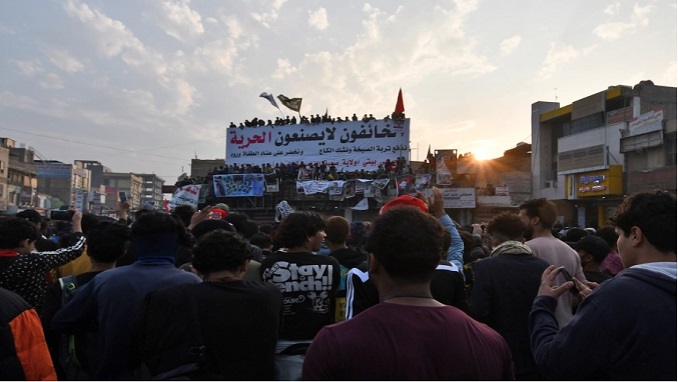A policeman has been killed and dozens of people injured in clashes between security forces and anti-government protesters in southern Iraq, Al Jazeera reports.
The violence erupted in Haboubi Square in the city of Nasiriya on Sunday after the recent arrest of activists in Dhi Qar province.
Witnesses said security forces opened fire to disperse demonstrators – including some throwing stones – from the city square that served as an epicentre of a widespread protest movement that began in October 2019. Dozens of protesters torched car tyres and blocked a main road in the city, witnesses said.
The policeman was “killed by a bullet to the head”, an unnamed medic in the city – 300km south of the capital, Baghdad – told AFP news agency. Other reports disputed that account, however. Officials said at least 18 protesters were injured and more than 40 were hurt among security forces.
Anti-government protests in Iraq’s Shia-dominated south have continued sporadically even as protests in Baghdad petered out with the spread of coronavirus and after a deadly government crackdown on demonstrators.
A sprawl of tents in Haboubi Square had remained in place until November 2020, when eight people were killed in clashes between anti-government protesters and followers of the Shia leader Muqtada al-Sadr. Anti-government protesters reoccupied the square on Friday, demanding the release of peers who have been arrested in recent weeks.
More than 500 protesters were killed in the crackdown on mass protests that began in October 2019, when thousands rallied against corruption, unemployment, poor public services and other grievances. The protests prompted then-prime minister Adel Abdul Mahdi to resign in late November 2019.
Kidnappings, targeted killings and arrests of protest leaders have continued. Alongside demanding an end to political corruption, protesters want jobs and improved public services. But the state’s ability to finance these demands is hamstrung by an economic crisis, including a yawning fiscal deficit.
The current government, led by Mustafa al-Kadhimi, is grappling with a deep economic crisis compounded by a fall in oil prices, the main source of Iraq’s income, as well as the COVID-19 pandemic.
